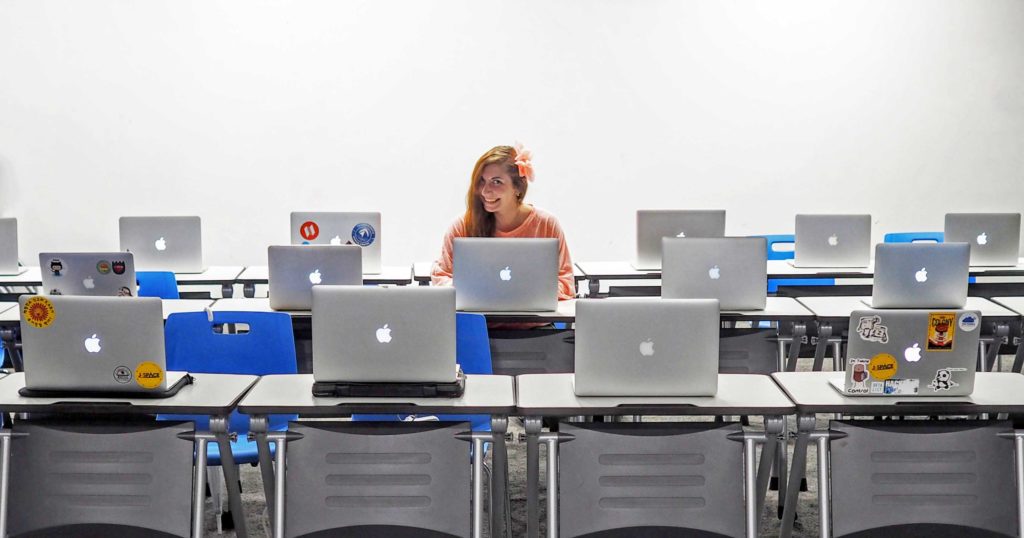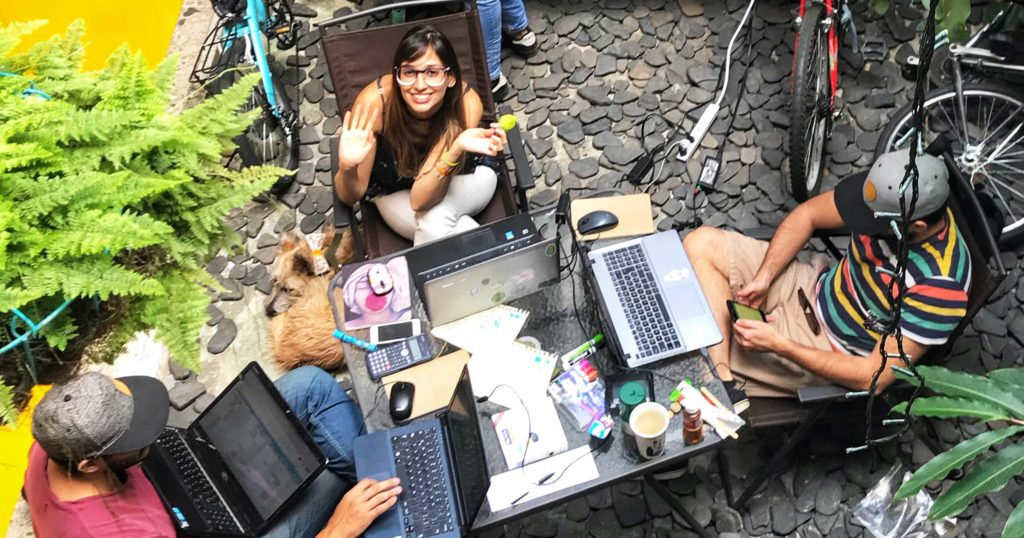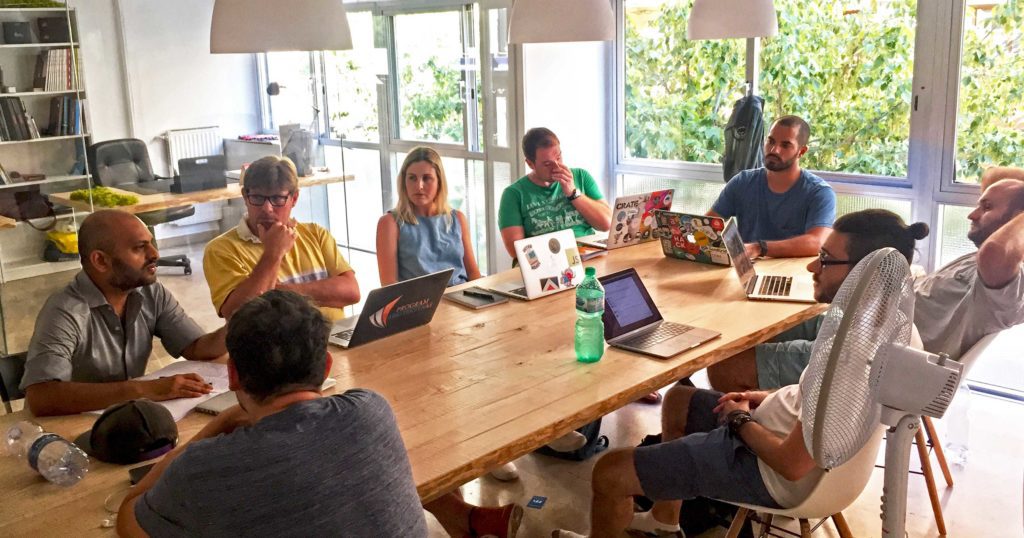You know what’s great? Being a digital nomad and seeing the world. You know what sucks? Worrying about whether you have enough money for the month because chasing down late payments from halfway around the world is really, really difficult. Even the best clients are sometimes uncommunicative or late to pay and both issues are a lot harder to resolve when you can’t just show up at their office. And this is assuming you already have a solid client roster.
Building a solid client roster is more effort than the work you do and it’s even harder to accomplish when you’re on the road. When you’re in the same city, or even the same country, it’s easier to do everything from meeting people at networking events to coordinating phone calls to talk about a project. Trying to pitch someone who is bright and peppy because it’s 10 am for them when you’re exhausted after a long day is super hard. Your energy level and enthusiasm doesn’t match theirs and they can tell. The balancing act of juggling multiple projects can also be harder as a remote freelancer. You won’t automatically have weekends and paid vacation days you can use as transit days. All of these are really solid reasons for not quitting your full-time job for a freelance career and they aren’t the only things that are more difficult as a remote freelancer. Why make it harder on yourself when you could keep the same job take it remote instead

Perks of Doing the Same Job Remotely
The perks of being a remote employee vs a freelancer extend beyond just paid time off and not having to find clients. The steady paycheck is really sweet too. It’s much easier to plan and book plane tickets and housing for future travel when you have enough coming in and know exactly when more money will be hitting your checking account. You won’t have to play the credit card balance juggling game because you will just know when and how much money is coming in. While a steady paycheck is a compelling reason to choose a job over freelancing generally, it’s even more persuasive on the road. Why waste your time chasing down payments when you could be out exploring instead?
And it’s not just the steady paycheck that is great but having a fairly predictable workload is glorious too. You may have busy periods with product launches or other project deadlines but you’ll know way in advance when those are happening because you’ll be part of the core team. You may even have some ability to push forward or back those dates. A freelancer rarely has the same predictable workload and schedule, especially when they’re working with new clients.
As a remote employee, you won’t have to wear pants to work! Okay, that’s a weird way of putting it but your office dress code will be out the window when you work remotely. Yes, you will have to put on normal clothes when you choose to work from a coworking space or cafe, but you can 100% have pajama workdays too. A word from the wise —it’s probably best if you save PJ days for when you don’t have video meetings with your colleagues or boss.

You’ll also be able to avoid distractions in the form of colleagues stopping by with a question or a comment. Yes, they’ll still be able to message you on Slack or via email but it’ll be easier for you to control your notifications and your distractions when they can’t just walk over and interrupt your workflow. You’ll be able to power through your work in uninterrupted focus sessions and your breaks can be really relaxing. This can be anything from taking a walk or going for a real lunch at a restaurant instead of playing catch-up over lunch at your desk because someone chatted away your morning and you couldn’t get them to leave your desk.
Of course, if you’re trying to pitch your employer on why they should let you go remote, focusing on the benefits for you is probably not the best way to go. You’ll make a much more compelling case for your remote working status if you can help them see how they’ll benefit too.
Perks of Having a Remote Employee
Your going remote isn’t just good for your ability to travel the world; it’s good for your company too, especially if the option is to retain you as a remote employee or lose you completely. It’s probably not the best idea to present it as a “remote or bust” proposition because no one likes ultimatums. However, if you can frame it in terms of their ability to retain a key employee like yourself — and it helps a lot to be known as an important, productive employee — you can negotiate it the same way you did your other employee benefits.
As Emily, a Hacker Paradise alum points out “If I was begrudging that I was stuck in an office I wouldn’t be as happy and it would probably show in my work. I’m a better worker for them BECAUSE I’m able to have this life. I also probably would have already left my job by now to find somewhere else that WOULD let me do this so they would have lost me.”
It’ll be a good idea to point out that remote employees are generally more productive. This is due to fewer in-office distractions like a colleague stopping by for a chat and interrupting your workflow but also because you won’t be wasting hours of your week on a commute. How much more energy will you start the day with when your commute is 2 minutes to your desk instead of standing on a crowded subway or sitting in traffic for thirty minutes to an hour?
If you’re a creative or problem-solving employee, the ability to change your scenery will help you too. Sometimes just switching from your desk at home to a coffee shop or co-working space or even just to the kitchen table will open up your mind. Changing your physical space can change your headspace as well which is a simple hack you really can’t do in an office where you’re expected to be at your desk.

Speaking of your desk, your company will no longer need to pay for your desk space, which can be expensive, especially in cities like London, San Francisco, and New York City. You no longer cost them rent, utilities, and office supplies. If you’re not the one managing the office budget (and good luck going remote if you are), you’d be surprised to learn how expensive all those seemingly small things can be for a company.
How to Pitch Your Company on Remote Work
If you already work at a remote-friendly company, this conversation will be easy for you. If you don’t and you’ll be the first remote employee, there are some things you should do before bringing up the remote work conversation.
- Establish yourself as a productive and dependable employee. Before you can talk about how much more productive and creative you’ll be as a result of working remotely, you need to have a strong reputation for being productive and dependable. Managers can be nervous about ensuring results from someone they don’t see on a daily basis so mitigate that concern in advance.
- Be prepared to track progress. When your manager can’t easily see that you’re showing up and working, it’s important to have agreed upon targets to enable your manager to see that you’re still working hard. These will likely be smaller progress goals than the ones you’re currently delivering but be patient and prepared for the extra work in the short-term while you and your company are finding your way to a functional remote working dynamic.
- Figure out how you’re going to communicate with your team. If you already have daily standups and communicate via Slack, you’re halfway there and can Skype into your standups and be reachable on Slack whether you’re across the office or the world. If your team doesn’t communicate digitally as much as you need, now is the time to start moving as much communication online as possible.

“Be prepared when you bring up the topic. You need to know how you can help with their concerns. For example how will you track your progress, how will you communicate. Maybe offer to make a trial run of couple of weeks to see if this works for the both of you.” – Noémi Puskás, a Hacker Paradise Alum, advises aspiring remote employees.
Right after a positive review or a successful launch is a great time to bring up the idea of working remotely. The company will be inclined to demonstrate their appreciation for your hard work and the fact you’ll have prepared so thoroughly for the discussion will indicate how important it is to you. Remember that one of their biggest concerns will be that you’ll no longer be productive as a result of poor internet or other issues, a concern you can easily mitigate by starting your digital nomad adventures with Hacker Paradise.
Hacker Paradise Helps You Work Remotely
One of the best things about Hacker Paradise is the coworking membership. Someone on staff always shows up to a location in advance and scouts out a great coworking space with high-speed internet. Whether you’re in Thailand (where the Internet is fantastic) or Mexico (where it is not), you’ll always have internet that is stable and speedy enough for all your calls and file transfers. Your company will love knowing that they don’t have to worry about whether you’ll be able to show up for important meetings or respond to messages because you’ll always have a good internet connection.
Another benefit that may sway your employer is the fact Hacker Paradise provides you with a great social network of other hard-working remote workers. Hacker Paradise requires people to apply and doesn’t accept people who aren’t working. They don’t discriminate whether it’s for a full-time employer, for clients, or on side projects, but the end result is that, as a Hacker Paradise participant, you won’t be around non-stop distractions like at your office or home. You’ll actually be able to focus more on your work because your social needs will be taken care of, unlike solo travelers who are responsible for figuring out everything from co-working to housing to dinner plans all on their own.

You can also leverage the fact Hacker Paradise has a focus on professional development with activities ranging from workshops to reciprocity rings to side project nights and more. You could learn new skills or walk away from a networking event with a connection that could help your full-time work. Historical speakers have included Matz, creator of the Ruby programming language, and Tavvi Kotka, the CIO of Estonia. Famous side projects have included The User Is Drunk, The Things Network, and Threat9.
Making the transition from stable full-time employee to digital nomad isn’t easy but keeping your full-time job will decrease the learning curve, as will joining a structured travel program like Hacker Paradise. Your employer will likely be justifiably concerned about your productivity on the road but if you are prepared and willing to work with your employer to mitigate their concerns, you could benefit from both full-time employment and seeing the world with the great group of people Hacker Paradise curates for you.







